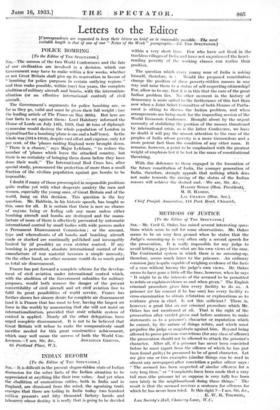Letters to the Editor
[Correspondents are requested to keep their leiter* as brief as is reasonably possible.- -The most suitable length is that of one of our NeWs of the Week' paragraphs.—Ed. THE SrEcrszon.],- POLICE BOMBING [To the Editor of THE SPECTATOR.] Sin,—The success of the two World Conferences and the fate of our civilization are involved in a decision, which our Government may have to make within a few weeks, whether or not Great Britain shall give up its reservation in favour of " bombing for police purposes in certain outlying regions " and thus make possible, within (say) five years, the complete abolition of military aircraft and bombs, with the internation- alization (or an effective international control) of civil aircraft.
The Government's arguments for police bombing are, so far as they go, valid and must be given their full weight ; (see the leading article of The Times on May 30th). But here are four facts to set against them: Lord Halsbury informed the House of Lords on July 14th, 1928, that 40 tons of diphenyl- cyanarsine would destroy the whole population of London (a typical load for a lbombing 'plane is one and a half tons). In the whole war (1914-1918), despite vast effort and expense, only 4.8 per cent. of the 'planes raiding England were brought down. " There is a chance," says Major Lefebure, " to reduce the number of 'planes which leave the attacked country, but there is no certainty of bringing them down before they have done their work." The International Red Cross has, after special study, pronounced the protection, of more than a small fraction of the civilian population against gas bombs to be impossible.
I doubt if many of those preoccupied in responsible positions quite realize yet with what desperate anxiety the men and women, especially the young ones, of Great Britain and of the world, hang on this decision. This question is the key question. Mr. Baldwin, in his historic speech, has taught us this, once for all. It is certain that there is now no chance of anyone being or feeling safe any more unless either bombing aircraft and bombs are destroyed and the manu- facture of more of them is effectively prevented by automatic international control by small bodies with wide powers under a Permanent Disarmament Commission ; or the amount, type and whereabouts of all bombs and bombing aircraft made or stocked are continually published and inescapably limited by (if possible) an even stricter control. If any bombing is permitted; absolute international control of the manufacture of war material becomes a • simple necessity. On the other hand, no other measure would do so much good as total air disarmament.
France has put forward a complete scheme for the develop- ment of civil aviation under international control which, with the abolition of the Government subsidies for military purposes, would both remove the danger of the' present convertibility of civil aircraft and 'set civil' aviation free to -fulfil its great• possibilities of world service. Franee has further shown her sincere desire for complete air disarmament (and it is France that has most to loge, having the largest air force in the world) by announcing that she will not insist on internationalization, provided that sdnie • reliable system of Control is applied.' Nearly all the other delegations have urged complete 'disarmament. It is not to be believed that Great Britain will refuse to make the comparatively small sacrifice needed for this great constructive achievement, which may well mean the success of both the World Con-










































 Previous page
Previous page